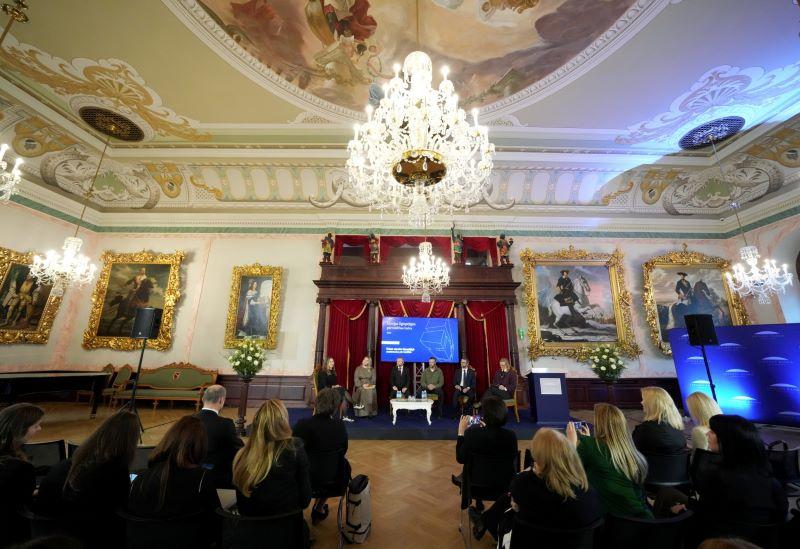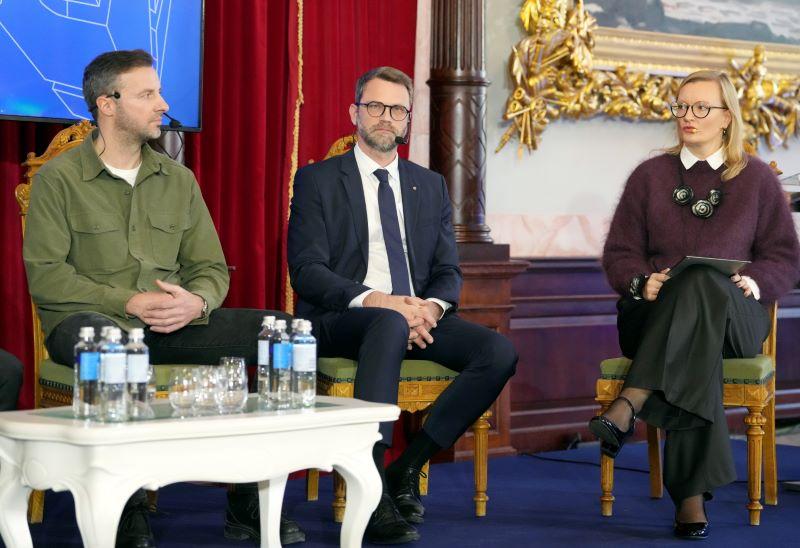RSU participates in discussion on ethics in sustainable corporate governance
Photo: Courtesy of the Bank of Latvia
On 11 December, the Bank of Latvia hosted the annual ceremony of the 2024 Sustainable Governance Awards. This ceremony also included a discussion on ethics in sustainable corporate governance. The discussion was attended by Assoc. Prof. Nora Jansone-Ratinika, Director of Centre for Educational Growth (CEG) at Rīga Stradiņš University (RSU) as well as representatives from Lidl Latvija, Rīgas namu pārvaldnieks, Kalve Coffee and Rīgas ūdens.
The discussion focused on the ethical aspects of sustainable corporate governance - what is the role of ethics in the development of a company and how can different aspects of ethics be applied in practice? Participants highlighted their experiences and best practices on how companies can not only make a profit, but also work for the benefit of society. The discussion dealt with issues such as how ethical principles are embedded into companies’ foundational documents and employment contracts, used to build a company’s corporate culture, to promote well-being and diversity, as well as to establish respectful relationships with business partners.
Assoc. Prof. Jansone-Ratinika outlined several areas where the ethical aspects of sustainable governance can be seen at RSU:
- Reducing the power vertical – involving staff and students in performance evaluations and in decision-making for improvements;
- Understanding the short-term and long-term impacts of RSU activities – the financial, environmental and social dimensions;
- Increasing collective and individual competence – knowledgeable, skilled and talented staff who are aware of the need to continuously learn and improve their know-how, each adding good ideas on what more can be done to make the academic environment around us greener and more attractive;
- Practical recognition, acceptance and support of diversity – creating an inclusive and respectful environment, respecting freedom of expression, while at the same time setting ethical red lines in studies, research and administrative work. Particular attention is paid to encouraging a multicultural environment, providing support for disabled people, and promoting academic freedom not only in theory, but also in the diversity of forms of expression by adapting working methods to different needs and abilities;
- system alignment – embedding sustainability principles, their implementation guidelines and responsibilities in university-level documents.
During the discussion, the CEG Director noted the importance of integrating ethical aspects for sustainability in all RSU core activities - studies, research, governance.
‘RSU is a research university that participates in building the future by providing modern, top-quality higher education and professional development opportunities.
The task of education is to help students to consolidate knowledge, skills, attitudes and values that will not expire after their exams, but will enable them to become responsible, ethical professionals and citizens,’ emphasised Assoc. Prof. Jansone-Ratinika. ‘We offer development opportunities to others through local and international cooperation, and we ourselves are in a never-ending process of learning and research. A training programme on building respectful relationships is a mandatory component for staff and students. We reinforce this understanding through practical simulations of ethical dilemmas. To create a safe environment for developing skills, we organise the study process via a simulation-based approach in both the social and health care study programmes. For example, students practice performing manipulations and caring for patients in a simulated hospital.’
Digital transformation
Nora-Ratinika continues: ‘One of the strategic development directions for RSU is digital transformation, including artificial intelligence (AI) solutions, which are increasingly present in the everyday life of the University. We have a virtual assistant Ieva. To ensure that the use of AI is responsible and mindful, we are the first university in Latvia to develop guidelines for the use of AI in higher education. We place a thoughtful emphasis on developing the pervasive skills to critically evaluate any technology and use it in a meaningful and ethical way.
RSU follows ‘green’ principles in everyday life
Addressing how daily life at the University is made more sustainable, Jansone-Ratinika explains: ‘We usually start with studying needs and collecting data to improve processes at the University, for example, by understanding what students and staff need physically, emotionally, and intellectually to create a more inclusive environment. We have carried out accessibility assessments and improvements and developed practical guidelines for lecturers to identify and support students with learning disabilities. The daily life of the University is “green” - we sort waste, we have an electric car park, we have bees on the roof, we use solar energy, and we do not use plastic cups.
To move on and to define strategic objectives on environmental, social and governance themes based on our experience, we have set up a working group to develop a Sustainable Development Action Plan to be implemented in 2025.’
In 2023, RSU received a special award for growth at the Latvian Sustainable Governance Awards for its contribution to the development of sustainable governance and growth, as well as improvements to corporate governance and for ensuring that the University's activities adhere to its pre-defined values.
This year was the fourth time that the Latvian Sustainable Governance Awards were presented to strengthen the implementation of the Latvian Corporate Governance Code and sustainability principles in business. The awards not only promote the efficiency and long-term value growth of Latvian companies, but also provides public recognition for best practice examples. This year, the Latvian Sustainable Governance Awards were presented to SJSC State Real Estate and JSC CleanR Group. The special award for growth in sustainable management was presented to Balcia Insurance SE, SJSC Latvian State Radio and Television Centre and the State Land Service.














